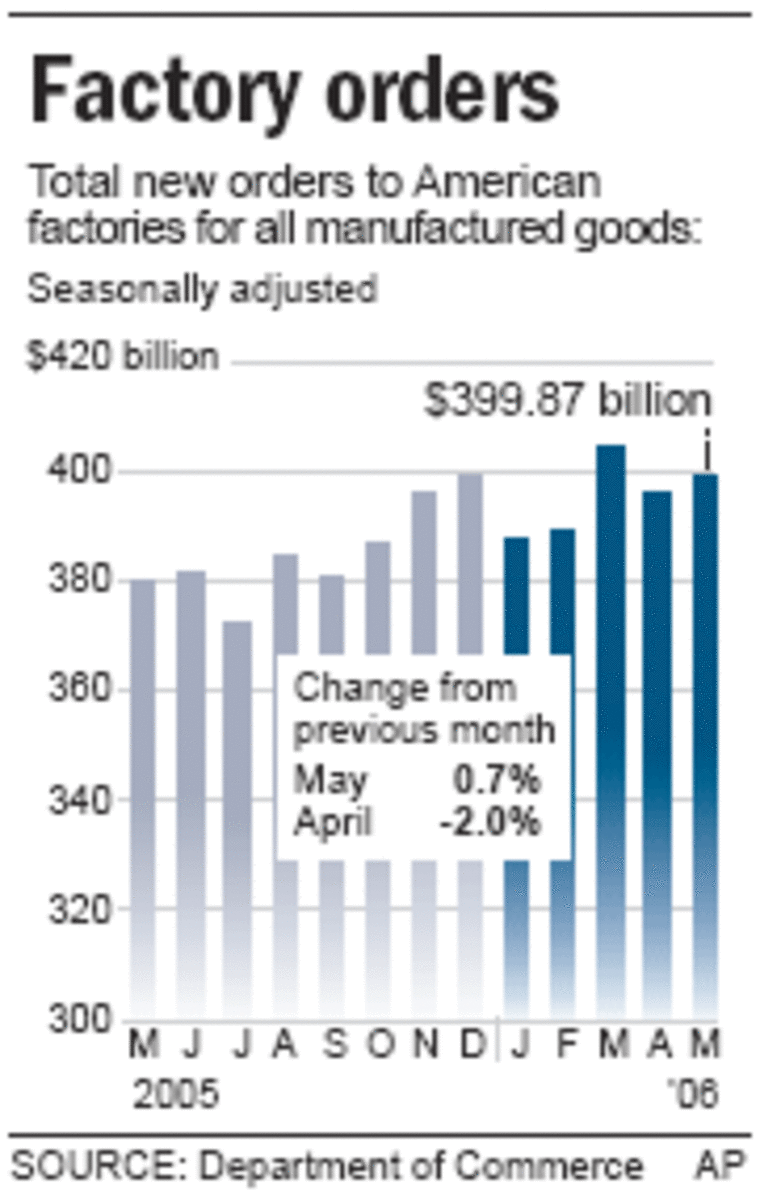Orders to U.S. factories for manufactured goods rebounded in May after a big decline the previous month as strengthened demand for petroleum and chemicals offset weakness in commercial aircraft and autos.
The Commerce Department reported Wednesday that new orders rose by 0.7 percent in May following a 2 percent plunge in April. The slight increase left orders at a seasonally adjusted $399.9 billion in May. The gain was significantly better than the 0.1 percent increase analysts had been expecting.
The overall strength in May stemmed from a 1.6 percent rise in demand for nondurable products. It offset a 0.2 percent drop in demand for durable goods, which are big-ticket items expected to last three years or more.
Analysts believe that manufacturing, a sector of the economy hardest hit by the 2001 recession, probably will slow in coming months along with the rest of the economy.
Overall economic growth raced ahead at a breakneck pace of 5.6 percent in the first three months of this year. But surging gasoline prices, rising interest rates and a cooling housing market are all weighing on the economy. Analysts believe economic growth slowed to about 2.5 percent to 3 percent in the just-completed April-June quarter and will remain at that pace in the second half of the year as consumers cut back on spending.
On Wall Street, concerns over record oil prices and North Korea’s nuclear ambitious drove down stocks. The Dow Jones industrial average fell 76.20 points to close at 11,151.82. Worries about North Korea’s test firings of seven missiles sent oil prices to a closing record of $75.19 on the New York Mercantile Exchange.
Economists said that the need by businesses to rebuild lean inventory levels will keep production from sliding too much in the coming months.
“So far this year, nondurables orders have risen by a cumulative 3.8 percent over a five-month period, and excluding the petroleum category, which has provided a sizable boost, the advance has been a still-healthy 2.8 percent,” said Stephen Stanley, chief economist at RBS Greenwich Capital.

The 0.2 percent decline in orders for durable goods was revised from an initial estimate of a 0.3 percent drop. The May decline followed an even bigger 4.7 percent decrease in April.
Both months were heavily influenced by a plunge in orders for commercial aircraft, which fell 17.9 percent in May following a 29.7 percent drop in April. Those big declines came after several months of exceptionally strong orders for Boeing Co.
Orders for autos and auto parts dropped 0.2 percent in May after a small 0.3 percent gain in April, with the weakness in the auto industry expected to continue based on June sales results.
General Motors Corp., Ford Motor Co. and DaimlerChrysler AG all reported sales declines in June compared with the same month a year ago as consumers, hit by surging gasoline prices, are turning from the sport utility vehicles and pickup trucks favored by Detroit automakers to smaller, more fuel-efficient cars.
Orders for primary metals such as steel rose by 4.6 percent in May while orders for machinery were up 2.5 percent. But orders for computers and other electronic products dropped by 2.5 percent.